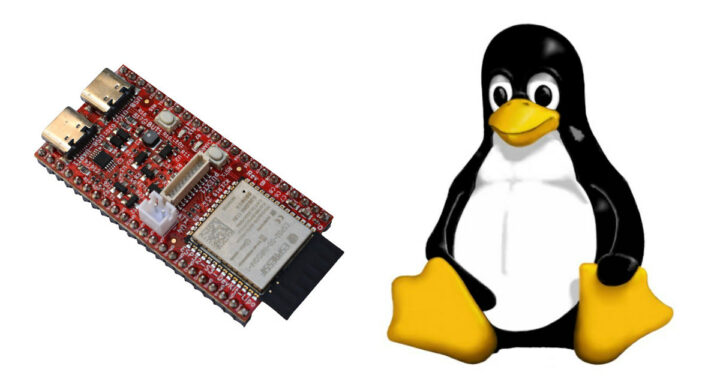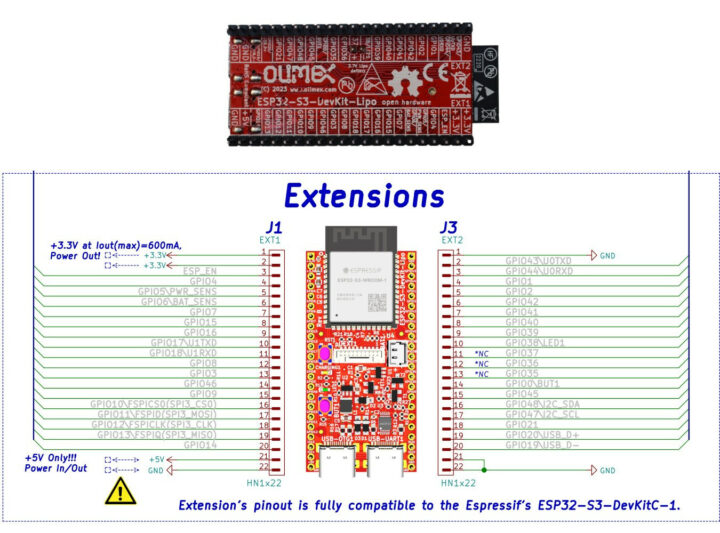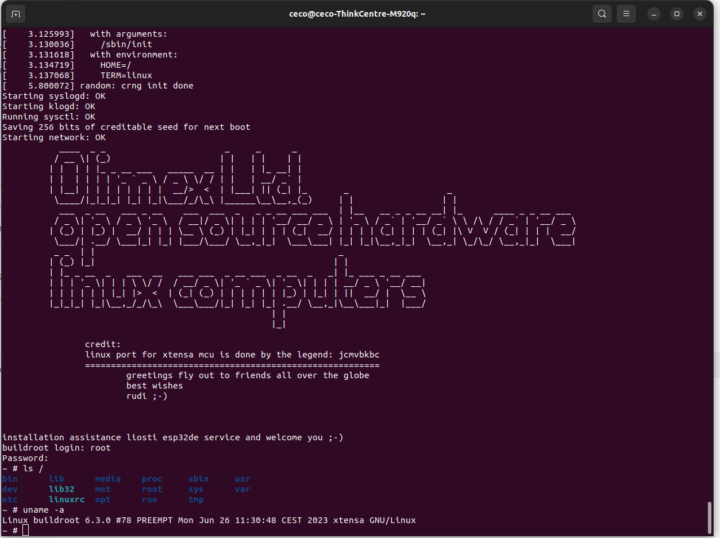Olimex ESP32-S3-DevKit-LiPo is a new open-source hardware ESP32-S3 board with 8MB flash, 8MB PSRAM, as well as LiPo battery and JTAG support that can run Linux 6.3, or the more traditional Arduino or MicroPython firmware.
The board is based on the ESP32-S3-WROOM-1-N8R8 module, features two USB-C ports for power, programming, and JTAG debugging, plenty of expansion with two rows of I/Os plus a pUEXT connector, Reset and Boot buttons, and a couple of LEDs.
ESP32-S3-DevKit-LiPo specifications:
- Wireless module – Espressif ESP32-S3-WROOM-1-N8R8 with
- SoC – ESP32-S3 dual-core LX7 microprocessor @ up to 240 MHz with Vector extension for machine learning, WiFi 4 & Bluetooth 5 LE/Mesh
- Memory – 8MB OSPI PSRAM
- Storage – 8MB QSPI flash
- PCB antenna
- Dimensions – 25.5 x 18.0 x 3.1 mm
- USB
- 1x USB Type-C OTG port also used for JTAG/Serial
- 1x USB Type-C port for USB-serial programming and power
- Expansion
- 2x 22-pin GPIO headers
- pUEXT connector
- Misc
- Green Status LED, Yellow Charge LED
- Reset and User button
- Power Supply
- 5V via USB-C port
- 2-pin connector for LiPo battery with LiPo charger
- Automatic power supply switch between USB and LiPo
- External power sense
- Battery measurement
- Dimensions – 56 x 28 mm
With two 22-pin headers and an additional pUEXT connector, Olimex’s latest board is also one of the third-party ESP32-S3 boards with the most I/Os. As mentioned in the introduction, the board is open-source with KiCAD hard design files, a user manual, and a binary Linux image available on GitHub. I just wish they could upload higher-resolution photos of their boards…
But you can also build the Linux image yourself by following the instructions using the linux-xtensa kernel by Max Filippov (jcmvbkbc). Those were successfully tested by Rudi (ESP32DE) on the ESP32-S3-DevKit-LiPo board who then shared the image with Olimex.
It should also work on other ESP32-S3 boards provided they have enough flash and PSRAM, and Rudi also tested Linux on the M5Stack CoreS3 devkit also loading the MicroPython package in Linux and running some simple scripts. It’s likely many features of the ESP32-S3 microcontroller won’t work under Linux, but WiFi does seem to work when used with ESP-Hosted.
Olimex has just started to sell the ESP32-S3-DevKit-Lipo for 12 Euros on their online store.

Jean-Luc started CNX Software in 2010 as a part-time endeavor, before quitting his job as a software engineering manager, and starting to write daily news, and reviews full time later in 2011.
Support CNX Software! Donate via cryptocurrencies, become a Patron on Patreon, or purchase goods on Amazon or Aliexpress







